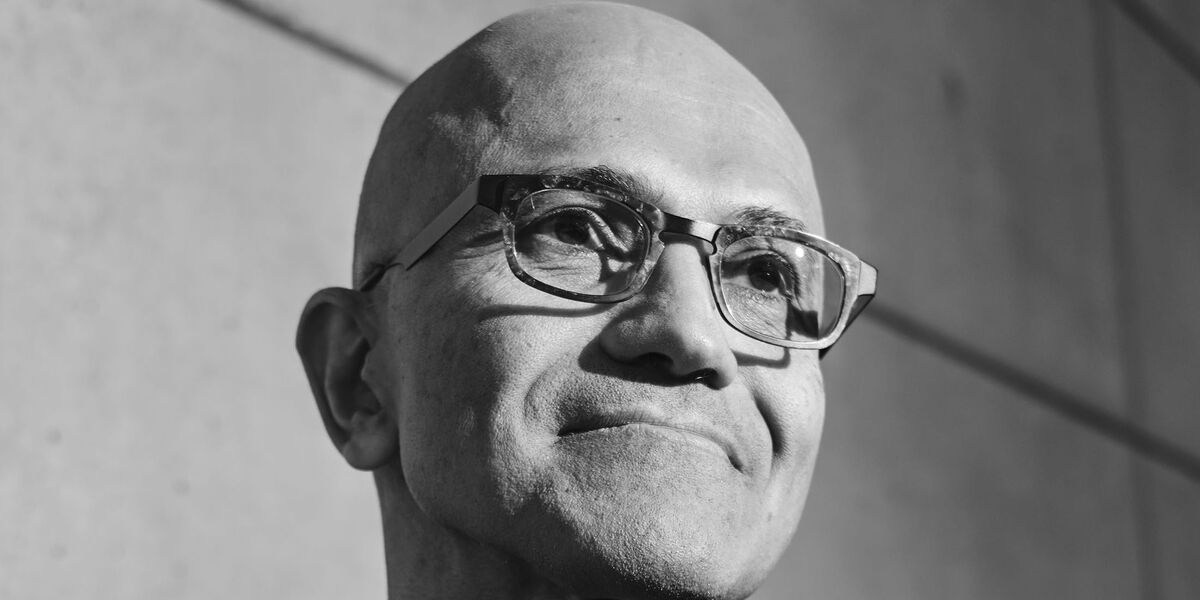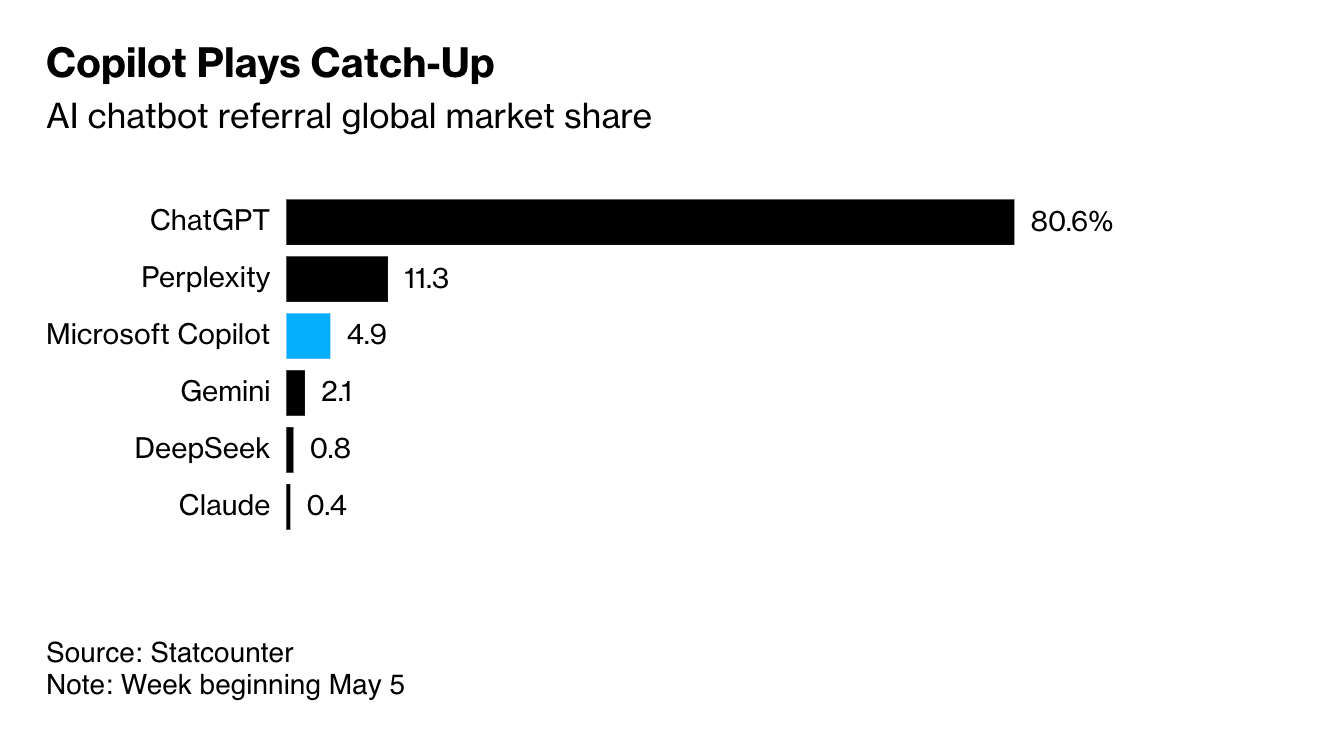Microsoft Zoom, Zoom, Zooms to the Defensive About AI

Hard to recall a profile I've read recently that left the subject sounding this defensive. And, in my opinion, it's not a good look for Satya Nadella. He's far more compelling when he's giving an honest assessment of a situation – as he did when he took over Microsoft from the famously defensive Steve Ballmer.
OpenAI CEO Sam Altman has repeatedly signaled that his company’s mission is to create an artificial general intelligence, a final frontier for the current AI era. With MAI-2, Nadella is instead pursuing maximum cost efficiency, even though it won’t be as intelligent as OpenAI’s most advanced models. He already feels a sense of ownership over OpenAI’s intellectual property. “MAI is not a clone,” he says. “When I have a contract [with OpenAI] that says, ‘Oh, I’m essentially funding it and have IP rights,’ it would be stupid to sort of do it twice. So we avoided that stupidity.”
If Nadella sounds defensive, that’s because he’s facing a concentrated version of the trial practically every CEO is undergoing now. Even with Microsoft’s considerable resources, Nadella must decide how AI will reshape his business by making a set of extremely difficult trade-offs—between embracing new-fangled technology and shielding his employees and business partners from disruptive systems, and between marching in line with what’s worked in the past and blindly leaping into the future. Up to this point, shareholders have lauded Nadella’s performance, making Microsoft the most valuable company on Earth. If he falls flat, though, his may be one of the first jobs threatened by AI.
You know a relationship is going well when one side busts out the "I have a contract" and "I'm essentially funding it and have IP rights".
Austin Carr and Dina Bass paint the picture of how Microsoft was fumbling the AI opportunity – an opportunity because of Nadella's insanely prescient early bet on OpenAI – even before "the blip",1 the coup that temporarily took down Sam Altman, which Nadella had to be called in to help fix.2 At first, it all seemed to be going swimmingly, thanks to GitHub Copilot. But then...
In 2022, OpenAI held demonstrations for senior Microsoft executives of a groundbreaking new model. Over the next several months, groups inside Microsoft tinkered with other ways they might adapt OpenAI’s technology to the daily needs of the modern office worker. One promising prototype called “intelligent recap” would summarize conference calls in Teams. Before Microsoft could release any of it, though, OpenAI built a deceptively simple chat interface around its language engine, and people went nuts. After the release of ChatGPT in November 2022, Microsoft found itself in a position similar to that of every other tech company: playing catch-up. It was especially bruising for Microsoft—almost as if the company had been holding the components for the original iPhone and didn’t know what to do with them.
The big mistake, as I've written before, was not putting Bing in a position to be ChatGPT when OpenAI launched it almost on a whim. While the initial "Bing Chat" got some buzz – thanks in large part to being the first way to try GPT-4 – it was an insanely clunky experience that became best known for the weird "leave your wife" hallucinations it started to spout to the NYT's Kevin Roose. Microsoft pulled it back and never recovered. From there, things just got more messy:
Nadella took a firmer hand directing the AI projects and setting aggressive deadlines. Within a month or so of ChatGPT’s debut, a software team held a demonstration for Nadella showing some OpenAI-powered functions built into Office programs. The idea was for users to select an option in Outlook to have AI compose an email reply or hit a button in Word to convert an outline into a rough draft. “Satya said, ‘Look, I just feel like we’re missing something,’” recalls Jared Spataro, who oversees marketing for Microsoft’s workplace apps. “‘This feels like just a set of features.’”
Instead of burying these new tools in different menus, Nadella pushed the teams to bundle all the OpenAI enhancements into a single assistant—later branded Copilot—pinned to the side of Microsoft’s apps. Some later grumbled that the vision wasn’t totally clear. Due in part to a lack of coordination between teams and a reticence to mess too much with what a former Copilot product manager calls the “crown jewels” (Windows, Word, Excel), the resulting AI assistants were inconsistent. The PowerPoint Copilot behaved much differently than the GitHub or Teams Copilot. “It felt like there were 13 different Copilots,” says a former Microsoft design leader who, like some other ex-employees interviewed by Businessweek, asked not to be identified to avoid career repercussions.
Calling all of these things the same name was clearly dumb. But certainly calling both Microsoft enterprise and consumer AI "Copilot" has been beyond confusing.
Yet it was clear something else was holding the company back from taking bigger risks with its products. The former Copilot manager describes it as a kind of post-traumatic stress disorder from embarrassments that stretch as far back as the proto chatbot Clippy, the animated paper clip that became an enduring punch line. ChatGPT could perform way more actions with fewer bureaucratic limitations, and Microsoft’s engineers knew it, this person says. He estimates that, of the hundreds of people in his organization, three-quarters of them paid out of their own pocket for ChatGPT, because Microsoft wouldn’t let them expense it. (Teper says it’s common for employees to test other companies’ services to better understand the market.)
On one hand, it sounds a lot like what was also holding back Google with regard to AI – before they've started to ship fast and furious with Search now fully under assault. On the other, it's absolutely ridiculous that Microsoft employees would have to pay out of pocket for ChatGPT – I'm not sure if it's worse that this wasn't a part of the "contract" Nadella loves to boast about, or the fact that Microsoft isn't letting their employees expense this. You're working at the cutting edge of AI, you need to be able to work at the cutting edge of AI. And a big part of that is knowing what the current state of the art looks like. This is one of those big company bureaucracy bullshit things.
A lot of these AI capabilities still depend on models from OpenAI, a fact Microsoft is less keen to advertise lately. Copilot will automatically deliver results using whatever Microsoft or OpenAI model is best for a particular prompt, rather than ask customers to choose. Meanwhile, ChatGPT gives users the ability to select from a jumbled list that includes 4o, 4.5, o3, o4-mini and o4-mini-high—designations that are probably more meaningful to robots than to people. Spataro, the Microsoft marketing leader, scoffs at the design choice. “Man, the interface is getting very loaded,” he says. (Altman has said OpenAI is working on simplifying its offerings.)
Agreed. Microsoft has gotten this part right, at least.
But this is my favorite part of the whole piece:
The rush to embrace DeepSeek in January wasn’t a one-off either. Microsoft added another DeepSeek model to its cloud catalog in March, renting it for half the price of an equivalent from OpenAI. Someday, Copilot could run certain queries through DeepSeek or another model available in Microsoft’s cloud—something the consumer and enterprise teams have been testing. These moves are not so much about hedging Nadella’s bet on OpenAI; it’s almost like he’s tossing chips every which way on the roulette table.
Of course, Nadella isn’t always winning. On the day in January when DeepSeek first dethroned ChatGPT atop the Apple App Store in the US, Copilot wasn’t anywhere in the top 200, according to research firm Sensor Tower. (Although DeepSeek’s open-source models are available on Azure, the startup runs its own mobile chatbot app, delivering no benefit to Microsoft.) Other latecomers, such as Google’s Gemini and Elon Musk’s Grok, are also consistently ahead.
Nadella points out that Microsoft was once less relevant in videoconferencing too. “Everybody would say, ‘Hey, Zoom, Zoom, Zoom,’” Nadella says. “We won that in the enterprise.” (A Zoom spokesperson declined to comment.)
Did you catch it? I'll highlight the key part just in case. "We won that in the enterprise." Zoom is an enterprise service. That's how Microsoft was able to combat it with Teams (just as they had – perhaps illegally with tying – with Slack back in the day).3 Yes, there was a time when consumers were using Zoom – it was called the pandemic. And when that lifted, most of Zoom's opportunity with consumers evaporated. ChatGPT (and Gemini and Grok, etc) are quite different. Yes, they're all used to varying degrees in enterprises as well, but the framing here is clearly around the App Store rankings and that is predominantly based around consumer usage. And Copilot, despite attempt after attempt after attempt, is just a non-player there right now.
I believe Microsoft can compete in enterprise, of course. Even if their offering isn't as good. They have the right relationships and their wallets. I do not believe they can compete in consumer in this market.
And it's hard to see how the currently stated plans – to make their chatbot more emotionally available – will change that. I'm not sure anything can change the situation at this point, ChatGPT clearly has reached escape velocity. It would perhaps take a company with a search engine used by billions to put their AI front and center to spur usage. Google has that, Microsoft does not.






1 I do appreciate that Microsoft management refers to the situation as “that particular incident” or “the November OpenAI sort of situation” – very Microsoftian branding when "the blip" is so much more clean (and fun, not that the situation was fun for anyone...)
2 Perhaps, in part, by Brian Chesky.
3 Disclosure: I was an investor and board oberserver at Slack before the company went public.






